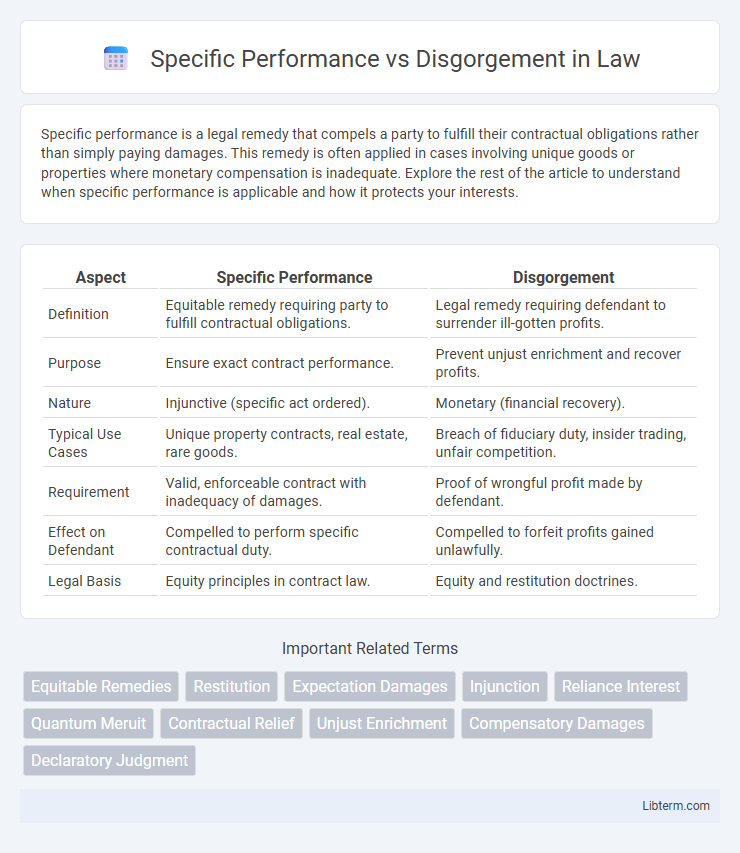Specific performance is a legal remedy that compels a party to fulfill their contractual obligations rather than simply paying damages. This remedy is often applied in cases involving unique goods or properties where monetary compensation is inadequate. Explore the rest of the article to understand when specific performance is applicable and how it protects your interests.
Table of Comparison
| Aspect | Specific Performance | Disgorgement |
|---|---|---|
| Definition | Equitable remedy requiring party to fulfill contractual obligations. | Legal remedy requiring defendant to surrender ill-gotten profits. |
| Purpose | Ensure exact contract performance. | Prevent unjust enrichment and recover profits. |
| Nature | Injunctive (specific act ordered). | Monetary (financial recovery). |
| Typical Use Cases | Unique property contracts, real estate, rare goods. | Breach of fiduciary duty, insider trading, unfair competition. |
| Requirement | Valid, enforceable contract with inadequacy of damages. | Proof of wrongful profit made by defendant. |
| Effect on Defendant | Compelled to perform specific contractual duty. | Compelled to forfeit profits gained unlawfully. |
| Legal Basis | Equity principles in contract law. | Equity and restitution doctrines. |
Understanding Specific Performance
Specific performance is a legal remedy in contract law that compels a party to fulfill their contractual obligations precisely as agreed, often used when monetary damages are insufficient. This remedy is commonly applied in unique goods or real estate transactions where substitution is impossible. Specific performance enforces the exact terms of the contract, ensuring the non-breaching party receives the benefit of the bargain rather than monetary compensation.
Defining Disgorgement in Legal Terms
Disgorgement in legal terms refers to the repayment of ill-gotten gains or profits obtained through unlawful or unethical conduct, aimed at preventing unjust enrichment. It is a remedial measure enforced by courts to compel wrongdoers to relinquish any financial benefits derived from their wrongdoing. Unlike specific performance, which mandates the fulfillment of contractual obligations, disgorgement focuses on stripping wrongdoers of their profits rather than enforcing contracts.
Historical Background of Both Remedies
Specific performance originated in equitable courts during the English common law era as a remedy to compel parties to fulfill contractual obligations when monetary damages were insufficient. Disgorgement has roots in equity and fiduciary law, developed to prevent unjust enrichment by requiring wrongdoers to surrender ill-gotten gains rather than compensating the injured party. Both remedies evolved to address limitations of legal remedies, with specific performance focusing on contract enforcement and disgorgement emphasizing restitution and deterrence.
Key Differences Between Specific Performance and Disgorgement
Specific performance compels a party to fulfill contractual obligations, enforcing the exact terms agreed upon, typically used in unique goods or real estate transactions where monetary damages are insufficient. Disgorgement requires a party to surrender ill-gotten profits obtained through wrongdoing, focusing on preventing unjust enrichment rather than enforcing contract terms. Key differences include specific performance's emphasis on contractual fulfillment versus disgorgement's aim to strip wrongful gains, with remedies differing by enforcing acts or restitution of profits.
When Is Specific Performance Granted?
Specific performance is granted primarily when monetary damages are inadequate to remedy the harm, such as in cases involving unique goods or real estate transactions. Courts consider factors like the feasibility of enforcement and the clarity of contract terms before compelling a party to fulfill their contractual obligations. This equitable remedy ensures the aggrieved party receives the exact performance promised, contrasting with disgorgement, which focuses on the defendant surrendering ill-gotten gains.
Scenarios Favoring Disgorgement Remedies
Disgorgement remedies are favored in scenarios where monetary gain from wrongful conduct must be reclaimed to prevent unjust enrichment, particularly in cases involving breaches of fiduciary duty or securities fraud. Unlike specific performance, which compels completion of contractual obligations, disgorgement focuses on stripping ill-gotten profits, making it ideal for situations lacking a suitable substitute for equitable relief. Courts often prefer disgorgement when the wrongdoer's gains are quantifiable and the victim's losses are difficult to ascertain or compensate.
Legal Requirements for Each Remedy
Specific performance requires proof of a valid contract and the inadequacy of monetary damages as a remedy, often involving unique goods or properties where substitution is impossible. Disgorgement demands evidence of unjust enrichment or wrongful gain, emphasizing the defendant's acquisition of benefits through improper conduct rather than contractual obligations. Courts grant specific performance to enforce precise contractual terms, while disgorgement aims to prevent unfair profit retention without necessarily enforcing contract terms.
Specific Performance vs Disgorgement: Case Law Examples
Specific performance compels a party to fulfill contractual obligations, often applied in real estate or unique goods cases, exemplified by *Lumley v Wagner* where the court ordered a singer to perform exclusively. Disgorgement requires a party to surrender profits gained through breaching a duty, as seen in *SEC v. Texas Gulf Sulphur Co.*, emphasizing restitution over compensation. Courts distinguish these remedies by focusing on enforcing contracts through actions versus stripping unjust profits to prevent unjust enrichment.
Advantages and Limitations of Each Remedy
Specific performance enforces contractual obligations precisely, ensuring the aggrieved party receives the exact benefit promised, which is advantageous in unique asset transactions like real estate. This remedy's limitation lies in its impracticality for contracts involving personal services or where continuous supervision is required, as courts are reluctant to compel ongoing performance. Disgorgement, on the other hand, mandates the defendant to surrender profits gained from wrongdoing, effectively deterring unjust enrichment and preserving fairness, but it may not fully compensate the victim for actual losses or deliver the specific benefit initially intended by the contract.
Choosing the Right Remedy: Practical Considerations
Choosing the right remedy between specific performance and disgorgement depends on the nature of the breach and the desired outcome. Specific performance mandates the breaching party to fulfill contractual obligations, ideal when unique goods or real estate are involved, whereas disgorgement requires the wrongdoer to surrender ill-gotten gains, focusing on preventing unjust enrichment. Practical considerations include the feasibility of enforcement, availability of monetary compensation, and the necessity to restore parties to their original position without unjust enrichment.
Specific Performance Infographic

 libterm.com
libterm.com